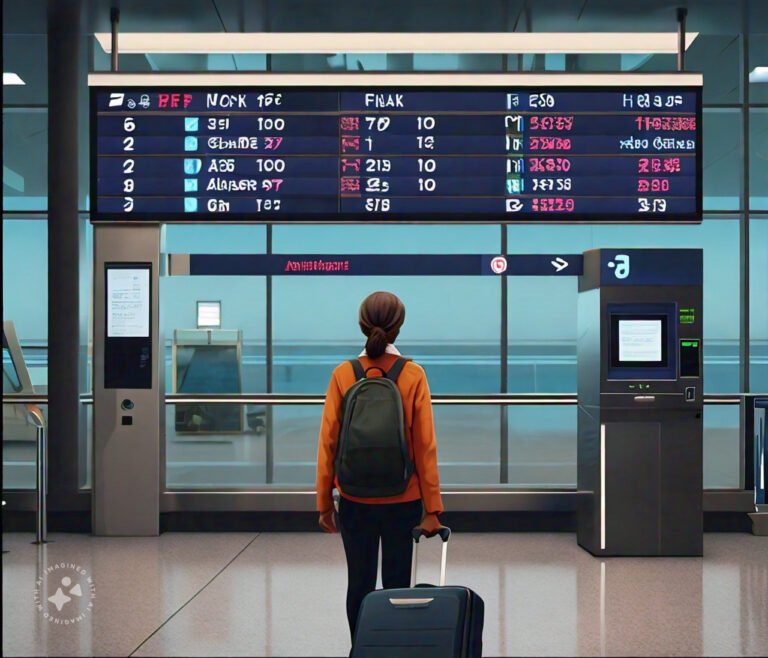Introduction
Air travel can be one of the most exhilarating ways to explore the world, but the journey from your front door to your final destination can come with its own set of stress-inducing challenges. From booking flights to handling luggage and navigating security checks, preparing adequately is key to making your journey as smooth and enjoyable as possible. This guide offers practical tips to help you navigate the airport and your flight with ease, ensuring a more relaxed and enjoyable experience.
1. Plan and Book Flights in Advance
Proper planning can make a tremendous difference in your travel experience. Here are ways to set yourself up for a smooth start to your trip:
Research Flight Options
Start by researching flight options early to get the best deals and seat selections. Many airlines offer early bird discounts, and booking well in advance can sometimes lead to additional perks. Plus, it gives you the chance to choose your preferred seat, whether you enjoy a window view or easy access to the aisle.
Consider Flight Times Carefully
Choosing the right time to fly can significantly impact your experience. Opting for flights during off-peak hours, such as early mornings or late nights, can mean fewer crowds, shorter security lines, and often a quieter travel experience. Avoid high-traffic times if possible, as this can make the airport experience less hectic.
Know Your Layover Options
For flights with layovers, giving yourself enough time between connections is key. A rushed layover is a common stressor for travelers. Aim for at least an hour between flights to allow for unexpected delays, gate changes, or security checks. Longer layovers can also offer a chance to stretch, grab a meal, or relax in an airport lounge.
2. Select the Right Luggage and Pack Wisely
Your luggage can have a significant impact on your comfort and convenience throughout your journey.
Choose Lightweight and Durable Luggage
Invest in a reliable suitcase or backpack that’s lightweight and durable. A sturdy, well-organized bag with compartments allows for better organization and easy access to your belongings. Spinner wheels and telescoping handles make it easy to navigate airports without straining your back or shoulders.
Pack Essentials in Your Carry-On
To ensure you have everything you need if your checked luggage is delayed, pack important items in your carry-on. This includes medications, chargers, a change of clothes, and personal care items. This way, you’re covered in case of unexpected situations, like delays or lost luggage.
Follow TSA Guidelines
To prevent delays at security, pack according to TSA guidelines. This includes keeping liquids in containers of 3.4 ounces or less, removing electronics and large items from your bag, and avoiding prohibited items. Familiarizing yourself with these rules can save you time and hassle at security.
3. Check-In Online and Download Your Boarding Pass
Technology can simplify the check-in process, saving you time and minimizing stress at the airport.
Avoid Long Check-In Lines
Many airlines offer online check-in 24-48 hours before your flight. This feature allows you to skip the long lines at the airport and head straight to security if you’re not checking any bags. Checking in early also increases your chances of securing a preferred seat and reduces your overall wait time.
Download the Airline App
Using your airline’s app provides easy access to your boarding pass and updates about your flight. Keeping the boarding pass on your phone minimizes the risk of losing it, and you’ll receive real-time notifications about gate changes, delays, and other important information.
Consider a Printed Backup
While digital boarding passes are convenient, technology can sometimes fail. For added peace of mind, it’s wise to have a printed boarding pass, especially for international flights where a paper copy may be required.
4. Arrive Early and Use Time Efficiently at the Airport
Arriving early and staying organized can greatly reduce pre-flight anxiety.
Be Punctual
It’s generally recommended to arrive 2-3 hours before a domestic flight and 3-4 hours for international flights. This ensures you have ample time for check-in, security, and unforeseen delays. Arriving early can also give you a chance to unwind, grab a coffee, or explore the airport shops.
Know Your Airport Layout
Getting familiar with the layout of your departure airport ahead of time can be helpful. Many airports offer apps or maps that show the locations of restrooms, lounges, dining options, and your gate. This knowledge can save time and help you avoid last-minute dashes through terminals.
Utilize Waiting Time Productively
Once you’re past security, you’ll likely have some time before boarding begins. Use this time to relax and prepare for the journey ahead. Read a book, listen to music, meditate, or catch up on emails. This can help calm any pre-flight nerves and make the waiting period feel shorter.
5. Dress Comfortably and Be Prepared for Security Checks
Dressing comfortably and preparing for security screenings can help reduce stress and enhance your overall travel experience.
Opt for Practical Clothing
Layered clothing is a good choice for air travel since it allows you to adjust according to cabin temperature. Comfortable shoes and clothes without excessive metal accessories make passing through security checkpoints faster and more convenient.
Follow Security Guidelines
When going through security, remove your laptop, large electronics, and liquids in advance. Placing these items in easily accessible areas within your bag helps streamline the process, making security checks quicker and less stressful.
Limit Jewelry and Accessories
Jewelry and other metal accessories can often set off alarms, leading to extra screenings. Wearing minimal jewelry and accessories not only makes security screening faster but also adds to your comfort during the flight.
6. Stay Hydrated and Carry Healthy Snacks
Taking care of your hydration and nutrition needs will keep you comfortable and energized during your journey.
Drink Plenty of Water
Airplane cabins can be quite dehydrating due to low humidity levels. Carry a refillable water bottle and drink plenty of water before boarding. After passing through security, you can refill it at airport water stations. Staying hydrated can help you feel more alert and comfortable.
Choose Nutritious Snacks
Healthy snacks like fruits, nuts, or granola bars are perfect for curbing hunger without relying on in-flight food. These snacks are convenient to pack, nutritious, and help you avoid high-sugar or high-sodium options that may be available on the plane.
Avoid Caffeine and Alcohol
Caffeine and alcohol can increase dehydration and disrupt sleep patterns. Avoiding these beverages before and during your flight can help you feel more comfortable, rested, and ready for your arrival.
7. Keep Important Documents Safe and Accessible
Keeping your documents organized and accessible helps prevent stress at critical moments.
Organize Your Documents
Store your passport, boarding pass, and other travel documents in a secure and easily accessible place. A travel wallet or document holder can help keep everything organized, saving time and reducing the risk of misplacing important papers.
Have a Digital Backup
Take photos of your important documents and email them to yourself or store them in a secure cloud location. If anything goes missing, having a digital copy will make it easier to reissue essential papers or provide proof of identity when needed.
Know Your Destination’s Entry Requirements
Different countries have unique entry protocols. Before traveling, review the destination’s requirements for visas, vaccination records, and customs forms. Being aware of these in advance can prevent last-minute complications at immigration.
8. Plan for In-Flight Comfort and Entertainment
Keeping yourself entertained and comfortable during the flight can make a significant difference in your overall travel experience.
Bring Noise-Canceling Headphones
Noise-canceling headphones can help you block out background noise, making it easier to sleep, relax, or focus on entertainment. They are especially useful on long-haul flights, helping you create a peaceful environment amidst the cabin sounds.
Create a Personalized Entertainment Kit
Download movies, music, podcasts, or e-books on your device before the flight. If the in-flight entertainment system doesn’t offer something you enjoy, having your own options can keep you entertained throughout the journey.
Bring an Eye Mask and Travel Pillow
For those hoping to sleep, an eye mask and a travel pillow can make the experience much more comfortable. Blocking out light with an eye mask and using a supportive pillow can help you get better rest, especially during long flights.
9. Prepare for Possible Delays or Cancellations
Planning for unexpected disruptions can help you handle delays or cancellations with ease.
Stay Updated on Flight Information
Weather or airline issues may cause delays or cancellations. Keep an eye on your flight status through the airline’s app, website, or real-time notifications to stay informed about any changes to your schedule.
Have a Backup Plan for Long Delays
Research nearby hotels or airport lounges in case of extended delays. Airport lounges provide a comfortable place to rest, charge devices, and have a meal. This can make long delays more bearable, and many lounges offer day passes for travelers.
Purchase Travel Insurance
For international or long-haul flights, consider buying travel insurance that covers delays, cancellations, and lost luggage. Travel insurance provides peace of mind and financial protection if your plans change unexpectedly.
10. Stay Positive and Enjoy the Journey
Maintaining a positive mindset is one of the best ways to keep stress at bay while traveling.
Maintain a Flexible Attitude
Air travel can be unpredictable, and delays or unexpected issues are sometimes unavoidable. Accepting this reality and maintaining a flexible attitude can make the journey more enjoyable. Focus on the adventure and excitement of travel, and be willing to adapt as needed.
Practice Mindfulness Techniques
If you’re feeling anxious, take a few deep breaths, listen to relaxing music, or try a quick meditation. These practices can help you stay calm, grounded, and ready for whatever the trip throws your way.
Embrace the Adventure
Finally, remember that travel is all about new experiences. The journey itself can be just as memorable as the destination. Use your travel time to anticipate the adventures ahead and enjoy every moment.
Conclusion
Stress-free air travel is about preparation, flexibility, and a positive mindset. By following these tips, you can reduce travel anxiety, stay organized, and keep comfortable. Whether you’re a seasoned traveler or new to flying, these strategies will help you make the most of your journey and ensure a smooth, enjoyable experience from start to finish. Safe travels!





